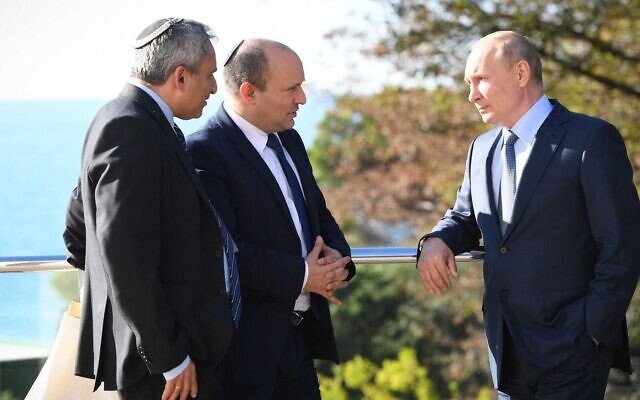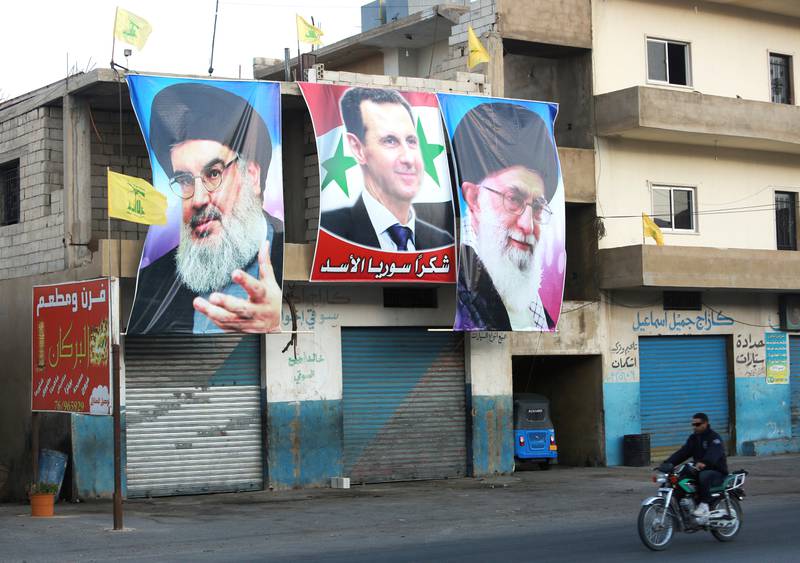
Israeli Prime Minister Naftali Bennett and Russian President Vladimir Putin had a “superb”, “productive” and “substantive” meeting, as described by the two leaders in Sochi on Oct. 22. Apparently, Russia gave Israel the green light to bomb Hezbollah in Syria. The group is in a precarious position at home as more factions speak out against it and the investigation into the Beirut port explosion goes ahead.
How will Hezbollah handle an assault in Syria and how will Syrian President Bashar Assad respond? Assad has not made any compromises so far and has been playing to both the Russian and Iranian camps. However, he might be forced to choose between the two and to compromise on some of his positions.
The Russians went to Syria in 2015 on an invitation from Assad. First, they did not want to lose their foothold into the Mediterranean and they also saw an opportunity to assert themselves in the region. Putin had said that the dismantling of the Soviet Union was a “genuine tragedy.” Since the breakup of the Soviet Union, Russia has lost its role in world affairs. However, Syria was the opportunity to reemerge on the global stage.
Putin had a clear plan for Syria. In the reconciliation the Russians orchestrated, opposition fighters had the option of either accepting Assad or boarding the green buses for Idlib. The plan was to de-escalate by separating the regime and the opposition in two distinct areas and then brokering a deal.
Things were not as simple as that. Six years after their entry into the war, the Russians are still unable to enforce any solution. Of course, the Turkish incursion in 2016 and what followed made their task even more complicated. The Russians found themselves in the “quagmire” that then US leader Barack Obama warned of.
It was difficult for them to forge a solution as planned for Syria since they were unable to force Assad to make any compromises. Assad has been skillfully playing the Russians against the Iranians. Russia has put pressure on Assad to compromise, including pressuring him to give amnesty to draft dodgers in order to facilitate the return of refugees, and has been involved in the constitutional committee in Geneva to ensure a settlement that can bring the different factions to the same table.
However, the Iranians have no interest in the Geneva process and do not want Assad to make any compromises. Although both countries support Assad, they have diverging goals. Russia wants stability in Syria in order to stop bleeding costs and to start recouping its investments. For Iran stability is not as important as keeping Assad in place and maintaining the links to Hezbollah.
Nevertheless, the Russians cannot give up on their ally and risk losing their prestige in the region and their reputation as a reliable ally. The Russians also were shocked when they went to Syria to see the terrible state of the Syrian Arab army. This adds another complication for Moscow. With a weak army, a change of political configuration might result in the collapse of the system.

At the end, inside the regime, Assad remains a consensual figure. Even today, with all their efforts to prop up the army, only two divisions have structure and order. The rest are more like gangs headed by warlords. The army has no centralized and cohesive control or command over all its divisions. The two divisions are the 25th Special Mission Forces Division headed by Suhail Al-Hasan, who takes orders from the Russians, and the 4th Armored Division headed by Maher Assad. who is loyal to Iran.
Although the Russians believe that Assad is on their side, they know deep down that he is not able or willing to compromise with the opposition. This recently pushed the Russian representative to the Geneva talks to criticize Damascus for blocking the last round of negotiations. This criticism came at the same time as the meeting between the two leaders. The Russian have been trying to get the Iranians out of Syria and vice versa. In this case, Israel could be doing Russia a favor. However, it is important now to see how Assad will react.
The question is, can he afford to put his fate in the hands of the Russians, who might be willing negotiate on his head and who know there will be no real solution as long as he is there? Will he accept becoming a figurehead? Will he agree to relinquish power and accept a settlement? Also, if he caves in and chooses the Russian camp, and turns his back on Iran and its proxy, what will be the position of Hezbollah? How will Hassan Nasrallah — who has told his followers repeatedly that the fight in Syria is existential — explain Assad’s betrayal? How can Nasrallah justify the deaths of hundreds of fighters on Syrian soil?
Iran cannot afford to have Assad defecting. It cannot afford to have the supply line to Hezbollah cut, and the armed group cannot lose face among his constituency, especially now that many factions are turning against the group in Lebanon. A defection by Assad will unmask the futility of the sacrifices Hezbollah pushed his followers to make. Though Assad has a better deal with the Iranians, who are less likely to put pressure on him, he is a survivor and it is doubtful that he will choose a losing team. It has yet to be seen where the Israeli strikes in Syria will drive Iran and its proxy Hezbollah.
• Dr. Dania Koleilat Khatib is a specialist in US-Arab relations with a focus on lobbying. She is co-founder of the Research Center for Cooperation and Peace Building, a Lebanese NGO focused on Track II. She is also an affiliate scholar with the Issam Fares Institute for Public Policy and International Affairs at the American University of Beirut.
Arab News

Leave a Reply